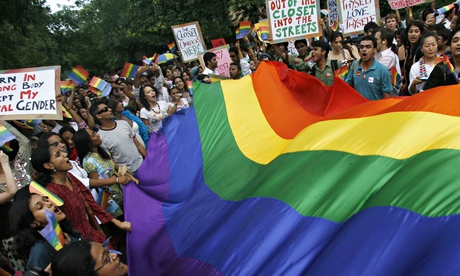
When Binyavanga Wainaina came out in a short story, on 19 January, the Kenyan writer received thousands of letters of support. Wainaina's announcement came as a response to what has been described as a "wave of officially sanctioned homophobia that is sweeping the continent", further illustrated by reports from Nigeria at the end of January.
Needless to say the attack on sexual freedoms is not confined to African countries (Russia, India and the USA have also recently made the headlines), nor is sexuality just about LGBT rights. Rather, some policymakers and researchers are advocating for a broader understanding of sexuality, seeing it as an umbrella conceptfor many different cultural, and individual, definitions. As the overview on sexuality research at the Institute of Development Studies states: "Understanding the relationship between sexual rights and poverty illustrates the need for aid policies and poverty alleviation efforts that account for sexuality and examine unspoken assumptions and exclusions."
So if sexuality and development aren't strange bedfellows after all, why, as academics Lawrence Haddad and Kate Hawkins argue, has "international development failed to afford sexuality the prominence that it should"?
Is it lack of understanding about how sexuality impacts upon every area of life, and as a result should influence policy and practice? Is it possible to challenge social norms without imposing western or urban ideals? Finally, how should organisations work with communities to create development programmes that are culturally sensitive? Join us to discuss in our live chat on Thursday, 6 February at 1pm GMT.
The live chat is not video or audio-enabled but will take place in the comments section (below). If you are unable to get online on Thursday, email your views to globaldevpros@theguardian.com or follow our tweets using the hashtag #globaldevlive
Panel
Sunil Babu Pant, founder and president, Blue Diamond Society, Kathmandu, Nepal.
Sunil is founder of the Blue Diamond Society, the first LGBTI rights and HIV organisation in Nepal. He was also the first openly gay member of parliament of Nepal for 2008-12.
Le Quang Binh, director, iSEE, Ha Noi City, Vietnam.
Binh Le, has a particular interest in the way in which ethnicity and sexuality prevent people from participating in, and enjoying, development. He is director of iSEE, a science and technology organisation working to protect the rights of minority groups in society.
Xiaogang Wei, executive director, Beijing Gender Health Education Institute, Beijing, China.
Xiaogang's background is as an actor and producer of LGBT films and documentaries in China. Since 2010, he's worked at BGHEI, one of the first Chinese NGOs to focus on issues of gender, sexuality and sexual health.
Pang Khee Teik, activist, Kuala Lumpur, Malaysia, @PangKheeTeik
Pang is an activist on issues of sexual orientation and gender identities as well as a Malaysian arts consultant, curator, photographer, and writer.
Dédé Oetomo, chair, Asia-Pacific Coalition on Male Sexual Health (APCOM), Surabaya, Indonesia. @dedeoetomo
Dédé is an educator and activist in the areas of HIV and Aids. In addition to his work with Apcom, he is the founder of Gaya Nusantara Foundation, a community based organisation dealing with sexual health and well-being services around sexuality and gender diversity.
Stephen Wood, research officer, Institute of Development Studies , Brighton UK. @StephenWood_UK
Stephen works on the sexuality and development Programme at IDS. He is currently examining how poverty reduction policies would benefit from a focus on sexuality that scrutinises their effectiveness and reach amongst marginalised on account of their sexuality.
Bertho Makso, coordinator, Proud Lebanon, Beirut, Lebanon.
Bertho works for Proud Lebanon, an organisation started in August 2013 to answer the needs of vulnerable LGBT individuals in Lebanon. It offers psychological, legal, medical support as well as capacity building to empower its beneficiaries.
Xiaopei He, executive director, Pink Space, Beijing, China.
Xiaopei has a background as an economist and has been involved in the womens movement in China and worked with people with disabilities and HIV. Xiaopei set up the Pink Space NGO to promote sexual rights and pleasure in China.
This content is brought to you by Guardian Professional. To get more articles like this direct to your inbox, sign up free to become a member of the Global Development Professionals Network

